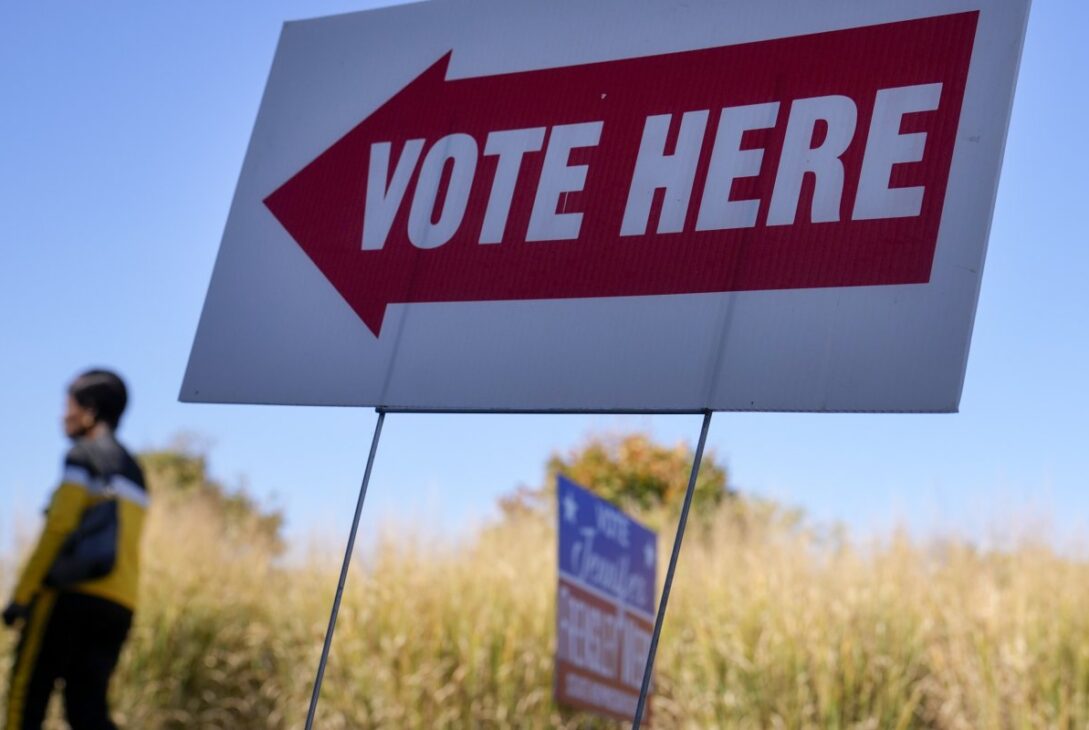The Safeguard American Voter Eligibility (SAVE) Act could prevent many married women from being able to register to vote.
The act, reintroduced by Texas Republican Representative Chip Roy, is intended to amend the National Voter Registration Act to ensure that all people registering to vote are U.S. citizens. It would require people to present in-person documentation as proof of citizenship when registering to vote.
Much of the documentation listed under the SAVE Act is based on having a birth certificate that matches the person registering to vote. However, as many as 69 million married women in the United States have changed their legal name since getting married, meaning their name does not match their birth certificate, according to the Center for American Progress.
Why It Matters
The United States has millions of residents who have entered the country illegally and are ineligible to vote.
Conservatives fear that they do, in fact, vote while liberals say there is no evidence that they do. Liberal politicians have tried to make it more difficult to weed out ineligible voters, including with some laws that make it unnecessary or even illegal to verify voter ID. The SAVE Act was proposed in response to these efforts. Liberals say that the measure would make it harder for some groups of eligible citizens, including Black people who have suffered a history of voter suppression, to cast their ballots.
What To Know
All citizens, with the exception of children and some felons, have the right to vote in the United States. The SAVE Act could make it significantly harder for married women, as well as others in the population, to exercise their right to vote.
If a voter does not have a passport, which nearly 146 million people in the U.S. don’t, it could be much more difficult for those who have changed their name to register to vote under the SAVE Act.
It is already illegal to vote as a noncitizen, and several measures, including providing a social security number to register, matching voter rolls to federal data, and, in many places, bringing voter ID to the polls, are in place across the country to ensure only citizens can cast a ballot.
The SAVE Act lists several types of documentation that would be accepted, including a form of identification issued consistent with the requirements of the REAL ID Act of 2005, a valid United States passport, valid military ID, forms of Tribal identification and proof of naturalization. Many of these forms of ID, other than a passport, either include a birth certificate or must be presented alongside a birth certificate.
The SAVE Act does not include proof of name change or a marriage certificate as acceptable proof of identity. This could be vital for married women with a birth certificate that does not match their current legal name.
Jonathan Diaz, director of voting advocacy and partnerships at Campaign Legal Center, told Newsweek: “All of these unintended or unforeseen kind of hurdles are really significant for people who are just trying to register and vote and participate in the democratic process.
“And when you see all of these different hurdles lined up in a row. It makes it pretty clear that the purpose of this bill is to make it harder for people to register and vote.”
Roy told Newsweek on Tuesday: “The legislation provides myriad ways for people to prove citizenship and explicitly directs states to establish a process for individuals to register to vote if there are discrepancies in their proof of citizenship documents due to something like a name change.”
He pointed to a clause in the SAVE Act that leaves it up to each state to establish a process for applicants to “provide additional documentation to the appropriate election official of the State as may be necessary to establish that the applicant is a citizen of the United States in the event of a discrepancy with respect to the applicant’s documentary proof of United States citizenship.”
However, Diaz said: “I think that [Roy is] trying to have it both ways here, by mandating this proof of citizenship requirement at the federal level and then saying, ‘Oh, but actually, it’s up to the states.’ That’s really not how it works, the way that the legislation is crafted.
“If you have a government-issued photo ID that does not indicate U.S. citizenship, which is what most IDs are…you can only register if you have some other document, like a certified birth certificate or a hospital record or something else that shows that you were born in the United States, or a naturalization certificate.
“Most [married women who have changed their name] do not have a birth certificate or other kind of citizenship document with their current legal name on it.” He added that even if states “create [a] filing process to satisfy the bill, you would have to go to your elections office with your original birth certificate and your current ID, and maybe your marriage license and then some other form…from when you changed your name…and then all of a sudden you’ve got, like, four or five difficult to obtain and expensive to reproduce government documents that you have to provide in person just to register to vote.”
A Republican representative introduced the act. However, if passed, the measure may actually reduce voting opportunities for Republicans, as a Pew study found that more Republican than Democratic women choose to change their name after getting married.
The SAVE Act also accepts valid passports as proof of ID. The states with the fewest number of people with passports are West Virginia, Mississippi, Alabama, Arkansas, Kentucky, Louisiana, and Oklahoma. All of these states voted for President Donald Trump in 2024.
Diaz referred to how Arizona implemented documentary proof of citizenship as a requirement to vote in the state. This was challenged in court and the state had to roll back those provisions for federal elections. He said: “States have tried similar systems before and they just don’t work. They prevent eligible Americans from registering and voting.”
Election workers face the threat of prison time under the SAVE Act, as it would impose a five-year prison sentence on election workers who register people to vote without proper documentation, regardless of whether that person is a U.S. citizen.
Roy has claimed that elections have been “hijacked” by foreigners, but the U.S. has minuscule levels of noncitizen voting and harsh punishments, including deportation for noncitizens who do try to vote.
An audit from Georgia counties in 2024 found that 20 noncitizens, out of Georgia’s 8.4 million registered voters, had attempted to vote. That is 0.00024 percent of the state’s voter list. All 20 were referred to law enforcement and had zero effect on the election.
In Virginia, just weeks before the 2024 election, the Supreme Court ruled that the state could move forward with a purge of voter rolls. Republican Governor Glenn Youngkin had signed an executive order to remove noncitizens from the rules, but was challenged by then-President Joe Biden‘s Justice Department which joined advocates in suing over the move. The Supreme Court ruled 6-3, with all three liberal judges dissenting, that the state could go forward with the move.
In California, a new law took effect on January 1, 2025, banning local governments from requiring ID for voters to cast their ballot. Democratic Governor Gavin Newsom signed the legislation in September in response to Huntington Beach passing a voter ID requirement.

What People Are Saying
Campaign Legal Center, in an analysis: “More than 21 million Americans are unable to access the additional documents that would be required to register to vote under the SAVE Act. People of color, married people who have changed their names, as well as young and elderly people are more likely to have difficulty in accessing these documents…. We already have strict laws in place to protect the security of our elections. The right to vote is a basic American freedom, and our elected officials should be working to protect that right, not restrict it.”
Jonathan Diaz told Newsweek: “The top line is that the SAVE Act would create really significant new burdens on Americans to register to vote. It would make it harder for most eligible American citizens to register and cast a ballot…. [States] don’t have the money and the resources to do this without appropriations from Congress, which the bill doesn’t provide for. And the impact on voters would be really significant.”
Representative Chip Roy in a statement to Newsweek on Tuesday: “This is absurd armchair speculation being spun up by media outlets who care more about clicks than reality…This bill isn’t being attacked because it’ll exclude citizens from voting — it won’t. It’s being attacked because the policy is wildly popular with the American people, its opponents want and need illegals to vote, and they’ll use anything they can to attack it.”
Cleta Mitchell, founder of the Only Citizens Vote Coalition, in a press release: “America’s elections must be lawful, fair, and free from fraud. The SAVE Act is a vital safeguard to ensure that only citizens vote in our elections—because every illegal ballot cancels out the voice of a lawful citizen voter…The integrity of our elections—and the trust of the American people in our elections—depend on it.”
Center for American Progress, in a January 31 article: “The only Americans who stand to benefit from the SAVE Act are out-of-touch politicians willing to trample on the rights of millions of citizens, including their own constituents, in order to score a few political points with the media and the administration.”
What Happens Next
The bill was introduced in July 2024 but failed to pass the Democrat-controlled Senate. Now, with Republicans in charge of both congressional chambers and the White House, the SAVE Act will likely make its way into law.
If the bill passes it is likely to have little effect on noncitizens voting, as there are so few cases of noncitizens trying to vote, but it will make it significantly harder for Americans to be able to register to vote.
Last modified: February 19, 2025


